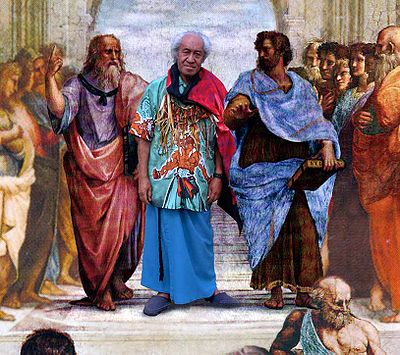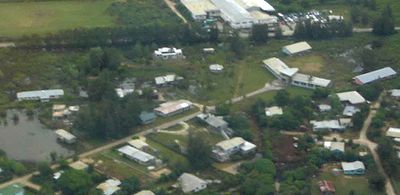
Futa Helu
Encyclopedia

Historian
A historian is a person who studies and writes about the past and is regarded as an authority on it. Historians are concerned with the continuous, methodical narrative and research of past events as relating to the human race; as well as the study of all history in time. If the individual is...
, and educator. He studied philosophy under the Australian empiricist John Anderson
John Anderson (philosopher)
John Anderson was a Scottish-born Australian philosopher who occupied the post of Challis Professor of Philosophy at Sydney University in the years 1927-1958. He founded the empirical brand of philosophy known as Australian realism...
and in 1963 launched an educational institute named Atenisi (Tongan for Athens
Athens
Athens , is the capital and largest city of Greece. Athens dominates the Attica region and is one of the world's oldest cities, as its recorded history spans around 3,400 years. Classical Athens was a powerful city-state...
, to pay homage to the ancient Greek philosophers, Herakleitos
Heraclitus
Heraclitus of Ephesus was a pre-Socratic Greek philosopher, a native of the Greek city Ephesus, Ionia, on the coast of Asia Minor. He was of distinguished parentage. Little is known about his early life and education, but he regarded himself as self-taught and a pioneer of wisdom...
in particular). The institute began as a continuing education programme for civil servants, then initiated a high school in 1964 and a university in 1975.
Life
Helu was born on 17 June 1934 in the village of LotofoaLotofoa
- See also :* List of islands and towns in Tonga...
on the island of Foa
Foa
Foa is an island in Tonga. It is located within the Haapai group in the centre of the country, to northeast of the national capital of Nukualofa.Foa is linked to adjacent Lifuka Island by a causeway, and is located 640 meters northeast of Lifuka....
in the Haapai archipelago
Ha'apai
Haapai is a group of islands, islets, reefs and shoals in the central part of the Kingdom of Tonga, with the Tongatapu group to the south and the Vavau group to the north. Seventeen of the Haapai islands are populated....
in the (Polynesian) Kingdom of Tonga. Helu, in fact, is a minor chiefly title, carrying the task of managing both the people and land of the village. In Haʻapai, Futa was a bright, although headstrong, student. In 1947 he was selected to be part of the founding class of the newly established Tonga high school
Tonga High School
Tonga High School is a selective state-owned co-ed secondary school located in Nukualofa, Tonga. The school educates students aged 11 to 18 .-History:...
sited in Tonga's capital, the school being a project of a promising Crown Prince who would accede to the throne as Tāufaʻāhau Tupou IV
Taufa'ahau Tupou IV
Tāufaāhau Tupou IV, King of Tonga, GCMG, GCVO, KBE, KStJ son of Queen Sālote Tupou III and her consort Prince Viliami Tungī Mailefihi, was the king of Tonga from the death of his mother in 1965 until his own death in 2006...
in 1967.
Helu studied in Australia at Newington College
Newington College
Newington College is an independent, Uniting Church, day and boarding school for boys, located in Stanmore, an inner-western suburb of Sydney, New South Wales, Australia....
(1953–1956) and the University of Sydney
University of Sydney
The University of Sydney is a public university located in Sydney, New South Wales. The main campus spreads across the suburbs of Camperdown and Darlington on the southwestern outskirts of the Sydney CBD. Founded in 1850, it is the oldest university in Australia and Oceania...
(1957–60). At Sydney he focused on philosophy, English literature, mathematics and physics. Back in Tonga in April 1961 he did not become – as one might have expected – a government bureaucrat, but held himself out as tutor to those having trouble keeping up at school. His way of teaching soon became famous, and many Tongans who are now important figures claim he instilled a love of learning that impelled their careers.
ʻAtenisi Institute was initially a downtown night school providing continuing education for civil servants, evolving into a secondary daytime school in 1964. In 1966 Helu registered ʻAtenisi's high school with the government and at the of that year leased a 6.5 hectares (16.1 acre) parcel in Halaano, a western district in the Tongan capital of Nukuʻalofa
Nukuʻalofa
Nukualofa is the capital of the Kingdom of Tonga. It is located on the north coast of the island of Tongatapu, in the southern most island group of Tonga.-Mythological origins:...
. The parcel is, in fact, below sea level and students often speak of the swampus instead of the campus. At the end of 1975 a small university joined the high school on the site, its first bachelor of arts degrees being awarded in 1980, followed a few years later by bachelor of science degrees. By the 1990s, some Master of Arts – and even a Ph.D. degree – were awarded in collaboration with universities in Australia and New Zealand.
Dr. Helu not only administered his institute but – like Thomas Jefferson
Thomas Jefferson
Thomas Jefferson was the principal author of the United States Declaration of Independence and the Statute of Virginia for Religious Freedom , the third President of the United States and founder of the University of Virginia...
at the University of Virginia in early 19th century America – designed its classrooms, laboratories, and libraries, often in classical style. Whilst small contractors were, of course, employed in ʻAtenisi's construction, in the early days its director was not above roofing a new building after class.
In 1992 Dr. Helu joined Tonga's Catholic
Catholic
The word catholic comes from the Greek phrase , meaning "on the whole," "according to the whole" or "in general", and is a combination of the Greek words meaning "about" and meaning "whole"...
bishop, Patelisio P. Fīnau, and the former president of the Free Wesleyan Church
Free Wesleyan Church
The Free Wesleyan Church is the largest Methodist denomination in Tonga. The royal family of the country are prominent members, and the late king was a lay preacher....
, Dr. Sione 'Amanaki Havea – in sponsoring a conference advocating Tonga's transition from a feudal to parliamentary monarchy. Not only did the Government resist this call but it punished 'Atenisi for its advocacy by thenceforth refusing to employ its university graduates, a severe penalty in the developing world. The boycott was lifted after the accession of a commoner prime minister in 2006 and the Government's concession to democratic principle.
Until her death in April 2008, Dr. Helu was married to Kaloni Schaaf; the union produced six children and numerous grandchildren. Two daughters have distinguished themselves in the performing arts – Sisiʻuno Helu, founding director of ʻAtenisi's performing arts troupe and orchestra, has staged Tongan faiva and spirited excerpts from Italian opera on tours of the Pacific and the U.S., [[ʻAtolomake Helu]] has sung soprano in noted international venues, such as Sydney and Auckland Town Halls. A son, Niulala Helu, is a former lecturer in Tongan culture at the University of Auckland
University of Auckland
The University of Auckland is a university located in Auckland, New Zealand. It is the largest university in the country and the highest ranked in the 2011 QS World University Rankings, having been ranked worldwide...
.
Dr. Helu was the author of several books, most importantly two books on Tongan culture, a monograph on Herakleitos, and a collection of essays regarding South Pacific culture. In 1999 the University of the South Pacific
University of the South Pacific
The University of the South Pacific is a public university with a number of locations spread throughout a dozen countries in Oceania. It is an international centre for teaching and research on Pacific culture and environment. USP's academic programmes are recognised worldwide, attracting students...
awarded him an honorary doctorate in literature. The scholar retired as institute director and dean of its university in 2007, replaced in the former post by his daughter Sisiʻuno (in 2008 and currently) and son Niulala (in 2009) ... and in the latter by Dr. Michael G. Horowitz, a U.S. sociologist who served as associate dean in the late '90s. Up until his passing Dr. Helu retained the title of Professor Emeritus of Philosophy and Tongan Culture.
In retirement, Helu remained an authority on Tongan history, tradition, and education, and although not a politician himself, remained an influential voice in Tongan politics due to the vindication of his advocacy of democracy.
The last years of his life were marred by declining physical and foremost mental health as he was suffering from some form of Alzheimer's disease
Alzheimer's disease
Alzheimer's disease also known in medical literature as Alzheimer disease is the most common form of dementia. There is no cure for the disease, which worsens as it progresses, and eventually leads to death...
.
Atenisi institute

High school
In the 1960s there were not many high schools in Tonga, and the few there were catered to either an economic or academic elite. To fill the gap, ʻAtenisi's high school assumed a populist stance, offering inexpensive and innovative education. Yet academic standards were high – for example, whereas other schools settled for the modest New Zealand syllabus, ʻAtenisi choose the more challenging syllabus of New South Wales, Australia.The 1970 and ʻ80s were the school's heyday, at one point attracting some 800 students; however, enrollment began to fall in the '90s in the face of diverse competition. By 2005 the situation became so pressing that school fees were no longer sufficient to cover costs. The school was, in fact, forced to close in 2006, but reopened in 2007 under revitalised leadership. Unfortunately this was short-lived. After 2009 is closed for good.
University
ʻAtenisi's university is unique in being the only privately founded university in the Pacific, and therefore autonomous from any church or government. This is both an advantage and a disadvantage. The advantage is that the university can freely train critical thought, rather than compel students to conform to bureaucratic obedience or religious dogma. The disadvantage is that the university rarely receives funding from either of the aforementioned source, which has usually condemned it to an austere budget solely supported by modest tuition fees.Because the university regards method of thought to be its pedagogical priority, philosophy has always been considered its most important course; facility with the English language and appreciation of English literature remains a second key objective. In addition, the university continues to offer core courses in the natural sciences, social sciences, arts, and humanities. Because of its reputation for rigour, most ʻAtenisi students have always found it relatively easy to obtain scholarships to graduate schools in New Zealand, Australia and the U.S.A.
Performing Arts Foundation
As part of its arts curriculum, the institute offers courses in music performance, e.g., piano, violin, and voice. Many students also join AFPA: the ʻAtenisi Foundation for the Performing Arts. A small but well-equipped orchestra was established in 2000. AFPA regularly tours overseas performing European classical and operatic excerpts side by side with traditional Tongan music and dance. This cross-cultural approach is typical of the 'Atenisi ethos and is consistent with the Heraclitian sentiment of 'one world, many things, an everlasting fire, common to all'. AFPA has thus astonished audiences from Australasia to Europe and the United States.The university's uncertain future
In the early years of the university, its emphasis on methodology was popular with Tonga's independent farmers: their sons might return to their modest plantations and display classical learning at weekend faikava (traditional kavaKava
Kava or kava-kava is a crop of the western Pacific....
circles). Yet with growing pressure for vocational success among Tonga's urban middle class, only the most talented students remain attracted to ʻAtenisi's classical credo. This has led to a decline in enrollment which, in the face of increasingly more viable tertiary training in Tonga and overseas, threatens the prospects of the small university that Futa Helu built.
External links
- http://atenisi.edu.to/ Official website of ʻAtenisi institute
- http://www.matangitonga.to/article/tonganews/personalities/20090203_tonga_futa-helu_atenisi.shtml obituary
- Documentary film on ʻAtenisi in production: http://www.publicfilms.co.nz/
- http://histfam.familysearch.org/oralhistories/media/054FutaHeluTonganVersion.pdf biographic interview

